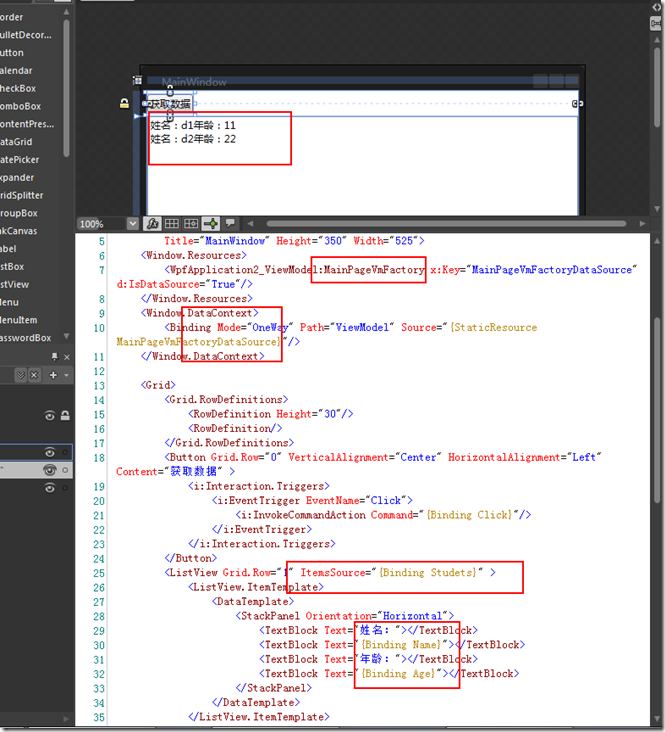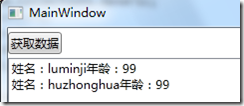MVVM模式之:ViewModel Factory与注入
基于以下的理由,ViewModel也是需要多个,并且需要被注入的:
1:设计时和运行时需要为View提供不同的数据
简单来说,就是设计时需要模拟数据。界面设计开发人员需要进行绑定(包括支持Expression Blend绑定)做一些简单的处理,同时因为提供了模拟数据,UI人员可以更好的设计实际的界面。
2:为了方便单元测试
在运行时,大部分情况下,ViewModel会组合进提供Service的业务类。在简单的应用中,我们可以注入Service类的MOCK来进行单元测试,如果是这样,就可以避免提供多个ViewModel。但在有些应用中,如Silverlight应用中,服务由WerbService、WCF提供,就无法让客户端应用服务所支持的接口类,并且客户端的代码都是自动生成的,这样我们就需要提供多个ViewModel来支持单元测试。
3:为设计时提供模拟数据
考虑到VM需要存在多个,所以UI的VM需要存在一个基类,假设我的UI需要显示一个学生的列表,那么我的VM基类设计如下:
1 2 3 4 5 6 7 8 9 10 11 12 13 14 15 16 17 18 19 20 21 22 23 24 25 26 27 28 29 30 31 32 | public class MainPageVmBase{ public MainPageVmBase() { click = new DelegateCommand(OnClick); } public IStudent StudentService { get; set; } public IView View { get; set; } private ICommand click; public ICommand Click { get { return click; } set { click = value; } } void OnClick(object arg) { View.Title = arg as string; View.Show(); } private List<Student> studets; public List<Student> Studets { get { return studets; } set { studets = value; } }} |
设计时的VM需要提供模拟数据,那么该VM为:
1 2 3 4 5 6 7 8 9 10 11 | public class MainPageVmMock : MainPageVmBase{ public MainPageVmMock() { Studets = new List<Student>() { new Student() {Name = "d1", Age = 11}, new Student() {Name = "d2", Age = 22} }; }} |
要让设计时显式模拟数据,我们需要用到一个DesignHelpers类(该类来自于https://github.com/jeremiahredekop/):
1 2 3 4 5 6 7 8 9 10 11 12 13 14 15 16 17 18 19 | public static class DesignHelpers { private static bool? _designMode; public static bool DesignMode { get { if (!_designMode.HasValue) {#if !SILVERLIGHT _designMode = new bool?(DesignerProperties.GetIsInDesignMode(new System.Windows.DependencyObject()));#else _isInDesignMode = new bool?(DesignerProperties.IsInDesignTool);#endif } return _designMode.Value; } } } |
借助于这个类的处理,这个时候我们在Expression Blend进行绑定的时候,就可以显式我们的模拟数据:
4:ViewModel FACTORY
每个UI绑定的VM实际都来自于VM FACTORY的类,如上面这个页面,我们绑定的就是MainPageVmFactory中的ViewModel属性。每个VmFactory也有自己的基类,如下:
1 2 3 4 5 6 7 8 9 | public class ViewModelFactory<TViewModelRealBase> where TViewModelRealBase : class, new(){ public TViewModelRealBase ViewModel { get; set; }} |
MainPageVmFactory如下:
1 2 3 4 5 6 7 8 9 10 11 12 13 14 15 16 17 18 19 | public class MainPageVmFactory : ViewModelFactory<MainPageVmBase>{ public MainPageVmFactory() { if (DesignHelpers.DesignMode == true) { this.ViewModel = new MainPageVmMock(); } else { using (IUnityContainer container = new UnityContainer()) { var section = (UnityConfigurationSection)ConfigurationManager.GetSection("unity"); section.Configure(container, "containerOne"); this.ViewModel = container.Resolve<MainPageVmBase>("MainPageVmReal"); } } }} |
可以看到,运行时的VM我们通过unity注入的方式来得到,本文一开头已经说过了,之所以采用注入方式是为了单元测试方便。注入的是MainPageVmReal这个类型,它包含有实际提供数据的服务类,如下:
1 2 3 4 5 6 7 8 9 10 11 12 13 14 15 16 17 18 | public class MainPageVmReal : MainPageVmBase{ public MainPageVmReal() { //Studets = new List<Student>() // { // new Student() {Name = "r1", Age = 11}, // new Student() {Name = "r2", Age = 22} // }; using (IUnityContainer container = new UnityContainer()) { UnityConfigurationSection section = (UnityConfigurationSection)ConfigurationManager.GetSection("unity"); section.Configure(container, "containerOne"); IStudent service = container.Resolve<IStudent>("StudentService"); Studets = service.GetAllStudent() as List<Student>; } }} |
MainPageVmReal中实际提供数据的服务类,可以是WCF的客户端代码,或者是任何别的东西,这里不是我们关注的重点,所以我们可以不用去管里面的那段注入代码。
运行时结果:
5:关于注入
注入这部分就很容易理解了,在配置处写入我们实际需要VM类型就可以了:
整体代码下载:WpfApplication20110811.rar









【推荐】国内首个AI IDE,深度理解中文开发场景,立即下载体验Trae
【推荐】编程新体验,更懂你的AI,立即体验豆包MarsCode编程助手
【推荐】抖音旗下AI助手豆包,你的智能百科全书,全免费不限次数
【推荐】轻量又高性能的 SSH 工具 IShell:AI 加持,快人一步
· 如何编写易于单元测试的代码
· 10年+ .NET Coder 心语,封装的思维:从隐藏、稳定开始理解其本质意义
· .NET Core 中如何实现缓存的预热?
· 从 HTTP 原因短语缺失研究 HTTP/2 和 HTTP/3 的设计差异
· AI与.NET技术实操系列:向量存储与相似性搜索在 .NET 中的实现
· 周边上新:园子的第一款马克杯温暖上架
· Open-Sora 2.0 重磅开源!
· .NET周刊【3月第1期 2025-03-02】
· 分享 3 个 .NET 开源的文件压缩处理库,助力快速实现文件压缩解压功能!
· Ollama——大语言模型本地部署的极速利器